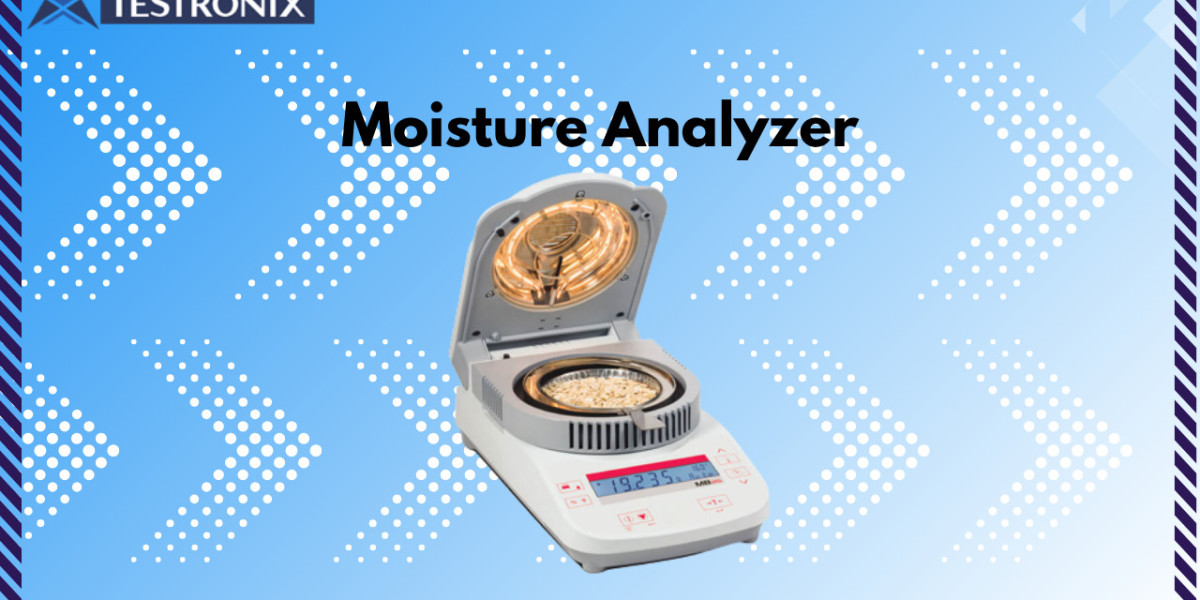Accurate moisture content measurement is a crucial factor in maintaining the quality, stability, and performance of materials across various industries. A moisture analyzer plays a vital role in material testing by providing fast and reliable results, helping manufacturers make informed decisions during production, quality control, and research processes. From raw material inspection to final product validation, moisture analyzers streamline workflows, reduce waste, and enhance product consistency. This article highlights the top five uses of a moisture analyzer in material testing, showcasing its value across diverse applications.
How Moisture Analyzers Support Material Testing
When testing materials, it's important to know how moisture levels affect how they act, how strong they are, and how stable they are. Knowing the exact moisture content is important for keeping quality standards and meeting compliance requirements whether you're working with powders, granules or solid samples. The next five sections look at five specific ways that a moisture analyzer helps with material testing in different fields.
Measure Moisture in Raw Materials
Controlling the amount of moisture in the raw materials is important for ensuring the consistency of the product and preventing problems from happening later in the production process. With a moisture analyzer, technicians can quickly check incoming materials to see if they meet the moisture requirements. This is especially important in fields like plastics, food, drugs, and chemicals, where even small changes can have an effect on how the product works and how it is made. By checking the raw materials right away, manufacturers lower the chance of rejecting a batch and having to do expensive rework.
Optimize Drying Processes
Drying is a common step in the process of making powders, pellets, and other materials. By accurately measuring the amount of moisture left over, a moisture analyzer helps you figure out when the drying process should be over. This keeps the material from drying too quickly, which can damage its properties or too slowly which can cause it to go bad or lose its strength. This feature is necessary for improving drying cycles and setting up standard operating procedures in material testing labs. It also saves energy because it cuts down on drying time that isn't needed.
Support Quality Control During Production
During production, consistent moisture levels are often key to achieving desired texture, weight, compressibility, and shelf stability. A moisture analyzer enables real-time testing of in-process materials, helping operators adjust conditions as needed to stay within specification. This continuous monitoring reduces variability and ensures that finished products meet internal quality standards as well as external regulatory requirements. It also reduces the chances of product recalls or customer complaints caused by moisture-related issues.
Verify Final Product Specifications
Final product inspection is a very important step in which the moisture content must meet the needs of storage, packaging, or use. A moisture analyzer is very important for making sure that the finished product or material is stable and ready to be sold.
For example, pharmaceutical tablets need to have the right amount of moisture to stay effective, and building materials like cement or wood need to be tested to make sure they are strong enough. This level of validation is very important for both following the rules and keeping customers happy.
Conduct Research and Development Tests
In research and development environments, testing the impact of moisture on new materials, formulations, or processing techniques is a routine requirement. A moisture analyzer provides precise data that helps scientists and engineers understand how different moisture levels affect performance, shelf life, and compatibility with other materials. It also supports experimentation with drying methods and moisture-control strategies. This makes the moisture analyzer a valuable asset in developing innovative materials and improving existing products.
Choosing the Right Moisture Analyzer for Your Needs
Not all moisture analyzers are created equal, and selecting the right one depends on factors such as sample type, required precision, speed of testing, and compliance standards. Whether for high-volume production monitoring or lab-based R&D testing, it is important to invest in a reliable and user-friendly moisture analyzer that fits your operational goals.
Manufacturers like Testronix Instruments supply moisture analyzers designed to meet a wide range of industrial requirements. These instruments are equipped with advanced heating and weighing technologies that deliver fast, accurate, and repeatable results. As part of a quality management system, a trusted moisture analyzer supports not only routine testing but also strategic decision-making.
Conclusion
These days, moisture analyzers often have digital interfaces, the ability to log data, and settings for user control. This makes them easy to use in both lab and factory settings. These features improve efficiency and traceability especially in regulated fields where paperwork is necessary.
The amount of moisture in a material determines how it behaves physically and chemically. The moisture analyzer is an important tool for all stages of material testing because it makes products more stable and cuts down on waste. This tool helps people make better decisions and get consistent results, whether it's used for production, quality control, or research and development. Investing in a reliable moisture analyzer is not only about getting accurate measurements but also about keeping the integrity of the whole process of testing materials.








